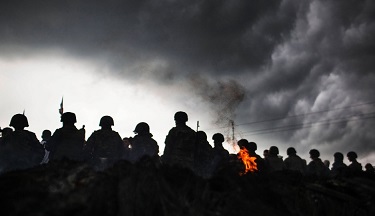Europe’s 9/11?
In an interview Sunday in the Frankfurter Allgemeine Sonntagszeitung, NATO General Secretary Anders Fogh Rasmussen compared the annexation of Crimea by Russia with 9/11 and the “war on terror.” This comparison says more than Rasmussen and the Frankfurter Allgemeine Sonntagszeitung perhaps intended.
For over twelve years, the terror attacks of September 11, 2001 have served the US government as a pretext for illegal wars and a massive buildup of its military forces. In the name of the “war on terror,” the US has attacked Afghanistan, Iraq and Libya; abducted, tortured and murdered suspected terrorists; spied on billions of people around the world; and built up the structure of a police state in America.
With the crisis in Ukraine, which they provoked, the ruling circles of Europe and, in particular, Germany, are embarking on a similar path. They are pursuing definite economic and geopolitical interests: pushing back Russia and expanding their influence in the Black Sea region, the Caucasus and Central Asia. They are also using the crisis to attempt to overcome deep-rooted popular opposition to militarism and build up the state apparatus in preparation for future class struggles.
Speaking to the newspaper, Rasmussen [also] called for a massive rearmament by Europe’s NATO members. “Stop running down your defense spending, turn the trend around and step by step invest more money in defense,” he demanded.
“What has happened in Ukraine must be a wake-up call for Europe,” he said. Russia had increased its defense spending by 30 percent, while some European NATO members had cut their spending by 40 percent.
The general secretary of the world’s biggest military alliance threatened Russia with “serious consequences” should it further destabilize Ukraine or provoke a conflict with a NATO member. The Russians, he said, cannot “have the slightest doubt that we consider an attack on one member as an attack on all of us.” He claimed that NATO’s deployment of troops, combat aircraft and naval units to Eastern Europe was a policy only of “deterrence.”

























